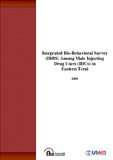Please use this identifier to cite or link to this item:
https://hdl.handle.net/20.500.14356/707Full metadata record
| DC Field | Value | Language |
|---|---|---|
| dc.contributor.author | Family Health International/Nepal | |
| dc.contributor.author | USAID | |
| dc.date.accessioned | 2013-02-17T19:14:20Z | |
| dc.date.accessioned | 2022-11-08T10:18:44Z | - |
| dc.date.available | 2013-02-17T19:14:20Z | |
| dc.date.available | 2022-11-08T10:18:44Z | - |
| dc.date.issued | 2005 | |
| dc.identifier.uri | http://103.69.126.140:8080/handle/20.500.14356/707 | - |
| dc.description.abstract | EXECUTIVE SUMMARY HIV transmission among drug users is associated with injecting drug use that involves the sharing of needles or syringes. Risky sexual behavior associated with drug use also contributes to the spread of HIV. Injecting drug users function as a “bridging population” for HIV transmission between a core HIV risk group, other high-risk groups and the general population. The main objective of this study was “to estimate the prevalence rate of HIV among injecting drug users (IDUs) and assess their risky behavior". The study was conducted in among IDUs in the sub metropolitan city and municipalities, and the highway areas of Jhapa, Sunsari and Morang districts of the Eastern Terai. Three hundred and forty five IDUs were sampled using the respondent driven sampling (RDS) methodology. While structured questionnaires were used to collect behavioral data, clinical blood tests were used to determine the rate of HIV infection. The clinical test procedure used involved collecting blood from a subject’s pricked finger and then storing it in 2-4 capillary tubes until tests could be performed. In order to determine a participant's infection status, a rapid test kit algorithm was used in which two rapid tests (Capillus and Determine) were initially conducted with Uni-Gold reserved as a tie-breaker. In terms of socio-demographic characteristics of the IDUs in the Eastern Terai, the study found that the median age of the IDUs was 25 years. A majority of them were either previously or currently married. The median age at marriage was 20.5. A majority of the IDUs had formal schooling. IDUs from different ethnic groups participated in the study. | en_US |
| dc.language.iso | en_US | en_US |
| dc.subject | Integrated Bio-Behavioral Survey (IBBS) | en_US |
| dc.subject | Male Injecting Drug Users (IDUs) | en_US |
| dc.subject | Eastern Terai | en_US |
| dc.title | Integrated Bio-Behavioral Survey (IBBS) Among Male Injecting Drug Users (IDUs) in Eastern Terai 2005 | en_US |
| dc.type | Technical Report | en_US |
| Appears in Collections: | Post Graduate Grant (PG) Reports | |
Files in This Item:
| File | Description | Size | Format | |
|---|---|---|---|---|
| IBBS_IDUs_Eastern Terai- Final-2005.pdf | Full Report. Download | 483.86 kB | Adobe PDF |  View/Open |
Items in DSpace are protected by copyright, with all rights reserved, unless otherwise indicated.
